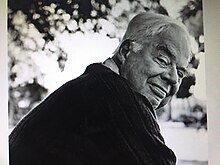Richard Rorty
| Richard McKay Rorty (kiri) | |
|---|---|
 Rorty (kiri) dan Akbar Ganji (kanan) | |
| Lahir | 4 Oktober 1931 New York City |
| Meninggal | 8 Juni 2007 (umur 75) Palo Alto, California |
| Era | Filsuf abad ke-20 |
| Kawasan | Filosofi Barat |
| Aliran | Pragmatism, Postanalytic |
Minat utama | Epistemology, Philosophy of language, Philosophy of mind, Ethics, Metaphilosophy, Liberalism, Meta-epistemology |
Gagasan penting | Postphilosophy, Ironism, Final vocabulary, Epistemological behaviorism |
Richard Rorty adalah seorang filsuf dari Amerika Serikat yang terkenal dengan pemikiran filsafatnya maupun karena pemikiran dalam bidang budaya.[1] Rorty dilahirkan di New York pada tahun 1931.[2] Pada tahun 1949, ia lulus dari Universitas Chicago, dan tahun 1952 dari Universitas Yale.[1][2] Rorty mulai mengajar di Wellesley College, dan kemudian pada tahun 1961, ia mengajar di Universitas Princeton.[2] Pada tahun 1979, Rorty menerbitkan buku pertama yang berjudul "Philosophy and the Miror of Nature".[1][2] Buku ini berisi kritik Rorty terhadap filsafat analitis yang berkembang pada masanya.[1]
Rorty berpendapat bahwa tidak ada prinsip-prinsip yang bersifat universal, dan ia juga menentang usaha Pencerahan untuk menemukan dasar rasional bagi pengetahuan manusia.[2] Di sini, Rorty mengambil posisi etnosentris radikal.[2] Baginya, pemikiran setiap manusia ditentukan oleh bahasa apa yang dipelajari orang tersebut.[2] Bahasa di sini dipahami sebagai perwujudan budaya tertentu, pandangan dunia tertentu, kepercayaan, dan nilai-nilai tertentu.[2] Akan tetapi, kehadiran seorang manusia di budaya tertentu bersifat kebetulan, sebab tidak ada orang yang dapat memilih di mana ia dilahirkan.[2] Oleh karena itu, Rorty berpendapat tidak ada budaya atau nilai-nilai yang paling benar dan berlaku universal.[2] Budaya atau nilai-nilai apapun hanya membantu pengembangan diri seorang manusia.[2] Dengan demikian, posisi Rorty di sini adalah pragmatisme.[2]
Referensi
[sunting | sunting sumber]| Umum | |
|---|---|
| Perpustakaan nasional | |
| Basis data ilmiah | |
| Lain-lain | |
Text is available under the CC BY-SA 4.0 license; additional terms may apply.
Images, videos and audio are available under their respective licenses.
